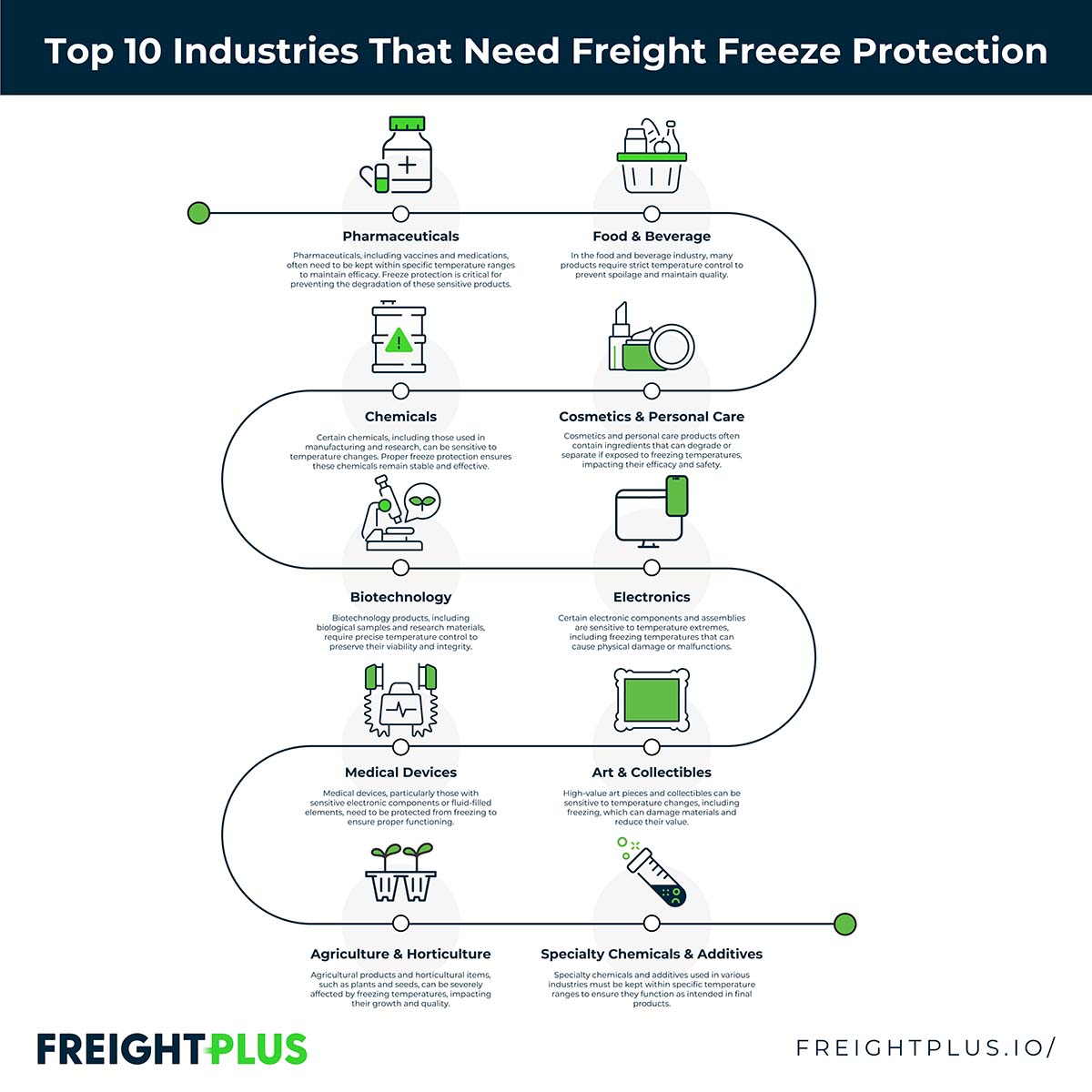Maintaining the integrity of temperature-sensitive shipments is crucial. Industries that handle goods susceptible to freezing require specialized freight freeze protection to ensure their products remain viable and safe. Here’s a look at the top 10 industries that rely heavily on freeze protection and why it’s essential for their operations.
1. Pharmaceuticals
Importance of Freeze Protection:
Pharmaceuticals, including vaccines and medications, often need to be kept within specific temperature ranges to maintain efficacy. Freeze protection is critical for preventing the degradation of these sensitive products.
Consequences of Failing to Use It:
Exposure to extreme temperatures can render pharmaceuticals ineffective, leading to potential health risks, regulatory non-compliance, and significant financial losses.
2. Food and Beverage
Importance of Freeze Protection:
In the food and beverage industry, many products require strict temperature control to prevent spoilage and maintain quality.
Consequences of Failing to Use It:
Improper temperature control can lead to food spoilage, loss of product quality, and potential health hazards, which can damage brand reputation and result in costly recalls.
3. Chemicals
Importance of Freeze Protection:
Certain chemicals, including those used in manufacturing and research, can be sensitive to temperature changes. Proper freeze protection ensures these chemicals remain stable and effective.
Consequences of Failing to Use It:
Freezing can alter the chemical properties, leading to unsafe or ineffective products, production delays, and compliance issues.
4. Cosmetics and Personal Care Products
Importance of Freeze Protection:
Cosmetics and personal care products often contain ingredients that can degrade or separate if exposed to freezing temperatures, impacting their efficacy and safety.
Consequences of Failing to Use It:
Exposure to extreme cold can compromise product quality and safety, leading to customer dissatisfaction and potential returns.
5. Biotechnology
Importance of Freeze Protection:
Biotechnology products, including biological samples and research materials, require precise temperature control to preserve their viability and integrity.
Consequences of Failing to Use It:
Temperature fluctuations can damage delicate biological materials, compromising research results and leading to wasted resources.
6. Electronics
Importance of Freeze Protection:
Certain electronic components and assemblies are sensitive to temperature extremes, including freezing temperatures that can cause physical damage or malfunctions.
Consequences of Failing to Use It:
Temperature-related damage can lead to product failures, increased warranty claims, and damage to the manufacturer’s reputation.
7. Medical Devices
Importance of Freeze Protection:
Medical devices, particularly those with sensitive electronic components or fluid-filled elements, need to be protected from freezing to ensure proper functioning.
Consequences of Failing to Use It:
Device malfunctions due to temperature extremes can result in patient safety issues and regulatory violations.
8. Art and Collectibles
Importance of Freeze Protection:
High-value art pieces and collectibles can be sensitive to temperature changes, including freezing, which can damage materials and reduce their value.
Consequences of Failing to Use It:
Damage to art and collectibles can result in significant financial losses and reduced historical value.
9. Agriculture and Horticulture
Importance of Freeze Protection:
Agricultural products and horticultural items, such as plants and seeds, can be severely affected by freezing temperatures, impacting their growth and quality.
Consequences of Failing to Use It:
Exposure to cold can result in plant damage, reduced yields, and economic losses for growers and distributors.
10. Specialty Chemicals and Additives
Importance of Freeze Protection:
Specialty chemicals and additives used in various industries must be kept within specific temperature ranges to ensure they function as intended in final products.
Consequences of Failing to Use It:
Temperature fluctuations can alter the chemical properties, leading to ineffective or unsafe products and increased production costs.
Conclusion
Freight freeze protection is indispensable for these industries, ensuring the integrity and effectiveness of their products. By implementing robust temperature-controlled shipping solutions, businesses can avoid the costly consequences of temperature-related damage and maintain the high standards required in their respective fields.





